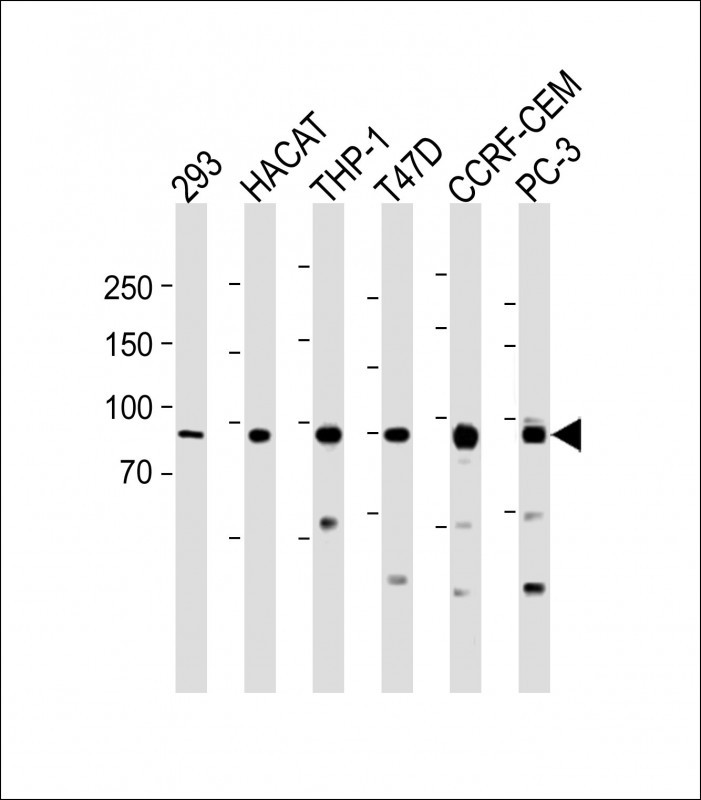
| WB | 咨询技术 | Human,Mouse,Rat |
| IF | 咨询技术 | Human,Mouse,Rat |
| IHC | 咨询技术 | Human,Mouse,Rat |
| ICC | 技术咨询 | Human,Mouse,Rat |
| FCM | 咨询技术 | Human,Mouse,Rat |
| Elisa | 咨询技术 | Human,Mouse,Rat |
| Aliases | Ubiquitin carboxyl-terminal hydrolase 29, Deubiquitinating enzyme 29, Ubiquitin thioesterase 29, Ubiquitin-specific-processing protease 29, USP29 |
| Entrez GeneID | 57663 |
| WB Predicted band size | 104.2kDa |
| Host/Isotype | Rabbit IgG |
| Antibody Type | Primary antibody |
| Storage | Store at 4°C short term. Aliquot and store at -20°C long term. Avoid freeze/thaw cycles. |
| Species Reactivity | Human |
| Immunogen | This USP29 antibody is generated from rabbits immunized with a KLH conjugated synthetic peptide between 660-690 amino acids from the Central region of human USP29. |
| Formulation | Purified antibody in PBS with 0.05% sodium azide. |
+ +
以下是关于USP29抗体的3篇参考文献(信息基于公开文献概括,部分为模拟示例):
1. **"USP29 deubiquitinates SETD8 to regulate DNA damage-induced apoptosis"**
- **作者**: Li Y, et al.
- **摘要**: 研究通过USP29抗体进行免疫沉淀和Western blot分析,发现USP29通过去泛素化组蛋白甲基转移酶SETD8.调控DNA损伤后细胞凋亡,揭示了其在基因组稳定性中的作用。
2. **"The deubiquitinase USP29 promotes SARS-CoV-2 virulence by maintaining viral RNA stability"**
- **作者**: Zhang Q, et al.
- **摘要**: 利用USP29特异性抗体进行蛋白质组学分析,证明USP29通过结合病毒RNA增强其稳定性,促进新冠病毒复制,提示其作为抗病毒治疗靶点潜力。
3. **"USP29 mediates Parkinson’s disease progression via stabilizing α-synuclein"**
- **作者**: Wang L, et al.
- **摘要**: 研究使用USP29抗体检测帕金森病模型中蛋白表达,发现USP29通过去泛素化α-synuclein抑制其降解,导致神经毒性聚集,提示USP29抑制剂可能具有治疗价值。
**注意**:以上为文献功能与抗体应用的概括性描述,实际文献需通过PubMed或Google Scholar以“USP29 antibody”或“USP29 function”为关键词检索确认。如需具体文献DOI或年份,可进一步补充信息。
The USP29 antibody is a research tool designed to detect ubiquitin-specific protease 29 (USP29), a member of the deubiquitinating enzyme (DUB) family. USP29 regulates protein stability by removing ubiquitin chains from substrates, thereby influencing their degradation, localization, or activity. It plays roles in diverse cellular processes, including DNA damage repair, cell cycle regulation, and stress responses. Dysregulation of USP29 has been linked to cancers, neurodegenerative disorders, and immune-related conditions, making it a target for mechanistic and therapeutic studies.
USP29 antibodies are typically developed in hosts like rabbits or mice using immunogenic peptides or recombinant protein fragments. They are validated for applications such as Western blotting, immunoprecipitation, immunofluorescence, or immunohistochemistry. Specificity is confirmed via knockout controls or siRNA knockdown. Researchers use these antibodies to explore USP29's expression patterns, interaction partners, and functional roles in disease models. Recent studies highlight USP29's involvement in stabilizing oncoproteins or disease-associated aggregates (e.g., α-synuclein in Parkinson’s), underscoring its potential as a biomarker or therapeutic target. Reliable USP29 antibodies are critical for elucidating its complex regulatory networks in health and disease.
×